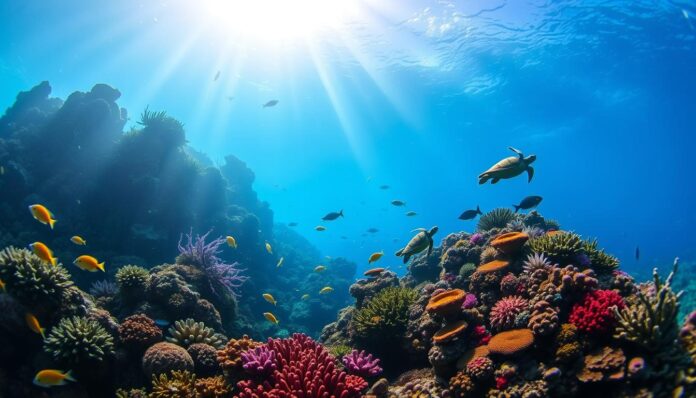| Best Time to Travel | April to October (dry season) |
| What to Expect | Visibility of up to 100 feet, warm water (79-84°F), diverse marine life |
| Diving Conditions | Year-round diving, but best during the dry season (less rain, calmer seas) |
| Marine Life | Warsaw grouper, barramundi, turtles, coral reefs, tropical fish, WWII wrecks |
Ever thought about the most untouched underwater paradise on Earth? The Solomon Islands offer a diving experience that will blow your mind.
Scuba Diving in the Solomon Islands is an amazing adventure. You’ll explore one of the world’s most untouched marine environments. With over 400 species of colorful corals and incredible marine life, these islands offer an unmatched underwater journey.
The Solomon Islands Diving scene is remarkably untouched. Its remote location means reefs and marine ecosystems are almost untouched. This creates a rare underwater sanctuary for marine lovers.
Key Takeaways – Scuba Diving in The Solomon Islands
- Pristine dive sites with minimal human interference
- Incredible marine biodiversity and coral species
- Water temperatures ranging from 26-29 degrees Celsius
- Multiple dive sites with unique marine experiences
- Rich World War II historical underwater landscapes
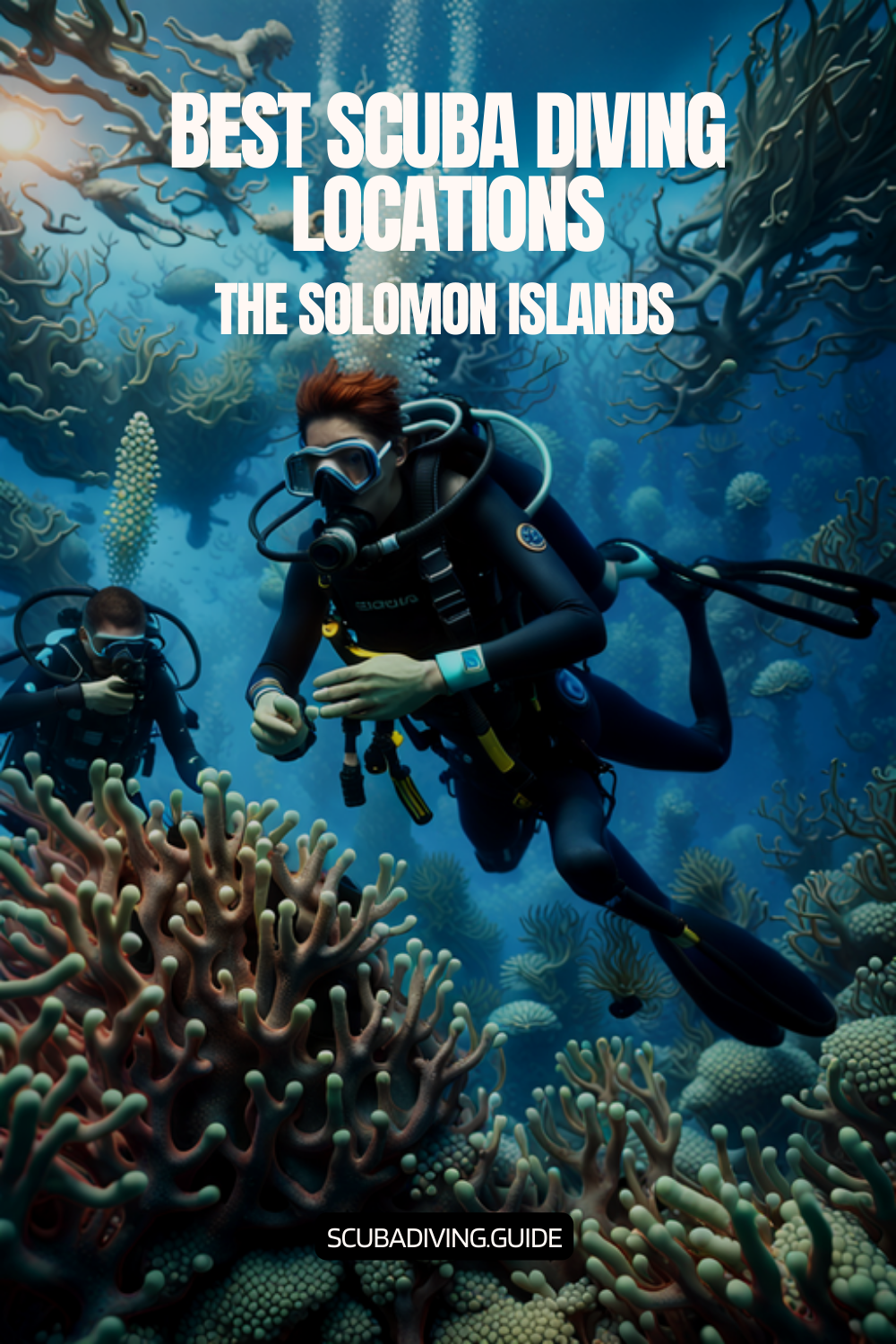
Introduction to Scuba Diving in The Solomon Islands
The Solomon Islands are a hidden treasure for underwater explorers in the South Pacific. Located at the eastern edge of the Coral Triangle, they offer a unique marine adventure. Divers can explore pristine and untouched underwater landscapes here.
With 992 islands, only 150 are inhabited. This makes the Solomon Islands a remarkable diving spot that’s mostly unexplored. Their unique location creates a marine ecosystem full of incredible biodiversity.
Overview of the Solomon Islands
This destination is fascinating for serious divers. It has:
- Total land area spanning multiple provinces
- Population of approximately 500,000 people
- Tropical climate with distinct monsoon seasons
Why Choose the Solomon Islands?
Divers are attracted to the Solomon Islands for several reasons:
- Unparalleled Marine Diversity: The islands are in the Coral Triangle, known for exceptional underwater biodiversity
- Remote and Pristine Diving Locations
- World War II Historical Underwater Sites
“The Solomon Islands are a diver’s paradise, where untouched reefs and historical wrecks tell stories beneath the waves.”
| Diving Conditions | Details |
|---|---|
| Water Temperature | 27-30°C |
| Diving Depth | 5-40 meters |
| Visibility | 10-30 meters |
| Best Diving Months | July-September, November |
The Solomon Islands offer diving all year round. They are known for their incredible marine life. This makes them a top choice for underwater exploration in the South Pacific.
Unique Marine Life to Discover
The Solomon Islands are a marine paradise in the heart of the Coral Triangle. They offer divers an underwater world full of vibrant marine life. This archipelago, stretching 1800 kilometers, is known as the ‘Amazon of the Ocean’ for its coral diversity and rich ecosystems.
Coral Reef Diving in the Solomon Islands is a unique experience. The region has some of the most pristine marine environments in the world.
Coral Reefs and Ecosystems
The archipelago’s marine ecosystem is full of stunning biodiversity. Divers can see:
- Healthy hard coral formations
- Intricate soft coral gardens
- Spectacular sea fans
- Diverse sponge ecosystems
Fascinating Species to Spot
Marine Life Encounters in the Solomon Islands are breathtaking. Divers will see:
- Massive schools of trevally and barracuda
- Colorful reef fish species
- Rare marine creatures like nudibranchs
- Pelagic species including sharks and turtles
| Marine Species Category | Notable Inhabitants |
|---|---|
| Pelagic Fish | Sharks, Barracuda, Trevally |
| Reef Dwellers | Seahorses, Cuttlefish, Eels |
| Unique Creatures | Nudibranchs, Mantis Shrimp |
“The Solomon Islands are a true underwater wonderland, with some of the most diverse and pristine marine environments on the planet.” – Marine Exploration Society
The tropical waters here have temperatures between 83.1ºF and 86.4ºF. This makes it an ideal place for marine life. It’s a top spot for Coral Reef Diving enthusiasts.
Best Diving Locations in the Solomon Islands
The Solomon Islands are a paradise for scuba diving lovers. They offer remote island getaways with stunning underwater landscapes. Divers get to experience the best of the South Pacific here.
These waters are a marine wonderland untouched by many tourists. The archipelago has dive sites with dramatic landscapes and World War II wrecks.
Bucket List Dive Sites
There are several must-see dive spots for unforgettable adventures:
- Mary Island: A top diving spot with:
- Massive schools of jacks and barracuda
- Large bumphead parrotfish
- Occasional napoleon wrasse sightings
- Twin Tunnels: A unique vertical dive site with:
- Tunnels dropping from 12 to 35 meters
- Rich marine ecosystem
- Devils’ Highway: Famous for spectacular manta ray encounters
Off-the-Beaten-Path Spots
For those who love adventure, these hidden spots offer unique experiences:
- Maravagi Bay: A macro diving paradise
- Leru Cut: A 100-meter underwater passage
- Mbulo Caves: Unique light and topographical conditions
“The Solomon Islands represent a diving frontier – raw, untouched, and magnificently wild.” – Professional Diving Expedition Journal
With fewer visitors than places like Fiji, these islands offer intimate diving experiences. They are a true gem for those seeking pristine waters.
The Best Time for Scuba Diving
The Solomon Islands have perfect diving weather all year. Divers can see amazing underwater sights every time. This makes diving in the Solomon Islands a top choice for those who love the sea.
The weather is always good for diving here. There’s little change in the seasons that could ruin your dive.
Seasonal Weather Patterns
Diving in the Solomon Islands is always great. The water is warm, between 26-30 degrees Celsius. This makes diving comfortable all year.
- Peak diving season: April to November
- Water temperature: 28-30°C (80-86°F)
- Visibility: Up to 40 meters
Understanding Underwater Conditions
The Solomon Islands are known for their amazing diving spots. They are a top place for exploring the ocean.
| Diving Condition | Details |
|---|---|
| Current Strength | Mild to moderate |
| Visibility Range | 15-40 meters |
| Seasonal Limitations | January-February maintenance period |
“The Solomon Islands offer an underwater paradise with remarkably consistent diving conditions” – Marine Exploration Society
Note for divers: While it rains from January to March, most dive spots close for maintenance. Plan your dive between April and November for the best experience.
Dive Certification: What You Need Before Diving
Getting ready for Scuba Diving in The Solomon Islands needs careful planning and the right certifications. Exploring the underwater world here requires specific skills and qualifications. This ensures a safe and memorable dive.
Understanding Certification Levels
Diving certifications are key for diving in the Solomon Islands’ rich marine environments. Most dive operators need certain qualifications for underwater adventures.
- Open Water Certification: Entry-level qualification for beginners
- Advanced Open Water: Allows deeper and more complex dives
- Specialty Certifications: Nitrox, Deep Diving, Wreck Exploration
| Certification Level | Depth Limit | Recommended for Solomon Islands |
|---|---|---|
| Open Water | 18 meters (60 feet) | Basic reef exploration |
| Advanced Open Water | 30 meters (100 feet) | Deeper reef and wreck sites |
| Specialty Nitrox | Varies | Extended bottom time |
Choosing the Right Dive School
Choosing a reputable dive school is key for Scuba Diving in The Solomon Islands. Look for instructors with:
- PADI or SSI international certifications
- Extensive local diving experience
- Small group sizes
- Modern safety equipment
“Your certification is your passport to underwater adventure in the Solomon Islands.”
Most liveaboards and dive operators in the Solomon Islands need a minimum Open Water certification. Physical fitness and comfort in water are equally important as your certification level.
Essential Gear for Diving in the Solomon Islands
Getting ready for diving in the Solomon Islands means choosing the right gear. The marine environment is unique, so you need specific equipment for a safe and fun dive. Think about what you need and the challenges of the sea when you pack.
Recommended Dive Equipment
For diving in the Solomon Islands, you’ll need the right gear. The warm ocean, between 27°C and 31°C, affects what you should bring.
- Dive Computer with spare battery
- Regulator with pressure gauge
- Surface marker buoy (safety sausage)
- Deployment line
- DAN dive accident insurance coverage
Photography and Specialized Equipment
Photographers should bring lenses for different underwater views:
- Wide-angle lens for big reef scenes
- Macro lens for close-up marine life shots
- Camera housing for underwater use
- Extra waterproof storage for your gear
Renting vs. Buying Gear
Divers have choices for their Solomon Islands trip.
| Option | Pros | Cons |
|---|---|---|
| Renting | Lower upfront cost | Potential equipment variability |
| Buying | Personalized equipment | Higher initial investment |
“Proper preparation prevents poor performance in underwater exploration.” – Diving Professionals
Don’t forget to bring extra items that help the local community, like clothes and basic medical supplies. Always put safety first and get good insurance for a great dive in the Solomon Islands.
Dive Packages and Tours
The Solomon Islands are a top spot for diving, known for their incredible underwater sights. With only a few dive operators, you can dive in some of the most untouched waters globally.
There are two main ways to dive in the Solomon Islands: land-based packages and liveaboard tours. Each has its own benefits for exploring the sea.
Popular Dive Operators
Two leading operators stand out in the Solomon Islands diving world:
- Bilikiki Cruises – A top liveaboard choice with over 25 years of experience
- Uepi Island Resort – Provides dive packages that meet SSI standards
Dive Package Details
| Package Type | Duration | Price Range | Included Dives |
|---|---|---|---|
| Land-based Package | 7 Nights | From $2,350 AUD | 10 Dives |
| Liveaboard Package | 7 Nights | From $4,935 USD | 10-14 Dives |
What’s Included in a Package
Dive packages in the Solomon Islands usually include:
- Accommodation
- Meals
- Professional dive guides
- Equipment rental
- Transport to dive sites
“The Solomon Islands offer an unparalleled diving experience that combines marine biodiversity with pristine underwater environments.” – Marine Exploration Magazine
Pro tip: Always buy dive insurance and make sure you have medical evacuation coverage before diving in the Solomon Islands.
Safety Tips for Diving in the Solomon Islands
Exploring the underwater world in the Solomon Islands requires careful planning and awareness. The area’s unique marine environment offers amazing diving experiences. But, safety must always be the top concern for scuba diving fans.
Diving in the Solomon Islands means knowing the risks and following strict safety rules. The marine ecosystem here is both a treasure trove and a challenge for underwater explorers.
Understanding Dive Risks
Divers need to know about several key risks in the Solomon Islands:
- Strong ocean currents around the islands
- Remote diving spots with little help nearby
- Potential marine wildlife encounters
- Underwater terrain that can change
First Aid and Emergency Procedures
Being prepared is key for safe underwater exploration here. Divers should follow these emergency steps:
- Get a certified scuba diving course before you go
- Always dive with a buddy
- Have dive insurance that covers you fully
- Learn basic first aid
| Safety Recommendation | Key Action |
|---|---|
| Air Supply Management | Monitor air levels, ascend with reserve |
| Equalization | Regularly equalize ears during descent |
| Ascent Rate | Maximum 30 feet per minute |
“Safety in diving is not about eliminating risks, but managing them intelligently.” – Professional Diving Expert
Divers should remember that the Solomon Islands’ stunning underwater landscapes are best enjoyed when approached with respect, preparation, and careful attention to safety protocols.
Cultural Experiences to Enjoy
Remote Island Getaways offer more than just underwater adventures. The Solomon Islands provide travelers with rich cultural experiences. These experiences transform a simple diving trip into an immersive journey of discovery and connection.
Diving in the Solomon Islands goes beyond exploring marine ecosystems. The local communities welcome visitors with warmth and traditional hospitality. This creates opportunities for meaningful cultural exchanges.
Local Communities and Traditions
Solomon Islands Diving experiences are enhanced by interactions with indigenous communities. Visitors can expect unique encounters such as:
- Traditional canoe welcome ceremonies
- Handcrafted artifact demonstrations
- Traditional dance performances
- Local storytelling sessions
- Artisan craft workshops
“Our culture is our greatest treasure, and we love sharing it with visitors,” says a local elder from Chuchulu village.
Sustainable Tourism Practices
Responsible travelers can engage with local communities through carefully designed cultural experiences. These experiences respect and preserve indigenous traditions.
| Cultural Experience | Location | Duration |
|---|---|---|
| Village Woodcarving Workshop | Chuchulu Village | 2-3 hours |
| Traditional Dancing | Marovo Lagoon | 1-2 hours |
| Local Cuisine Preparation | Various Communities | Half-day Experience |
Travelers can contribute to local economies while enjoying authentic cultural interactions. These interactions go far beyond typical tourist experiences.
Underwater Photography: Capturing Your Dive
Exploring the Solomon Islands underwater is a dream for photographers. The clear waters are a perfect setting for capturing stunning moments of your dive. It’s a chance to create lasting visual memories.
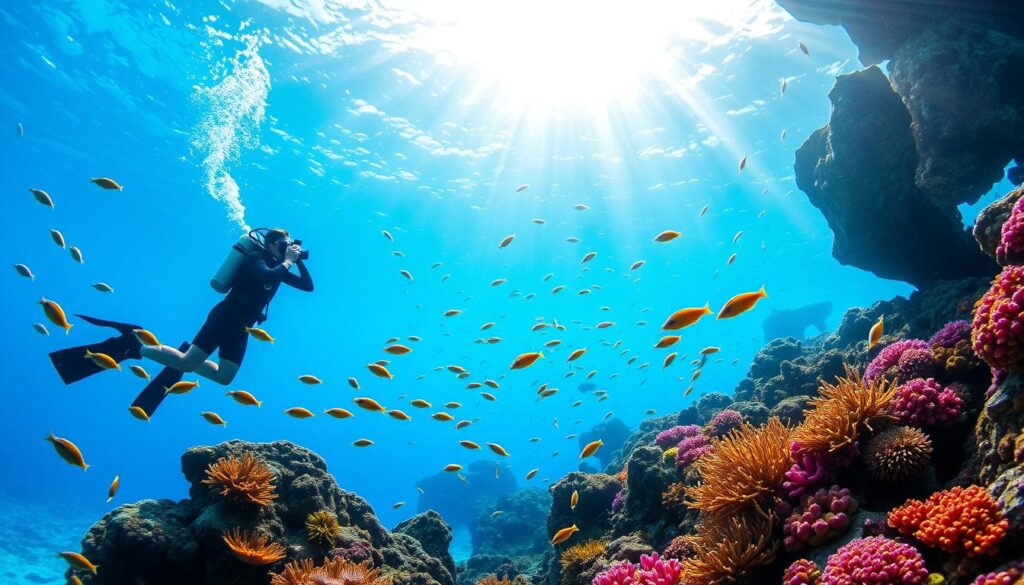
Choosing the right gear is key for underwater photography. Experts say to bring lenses that can handle different marine settings:
- Fisheye lens for wide-angle shots of schooling fish and wrecks
- 60mm or 100mm macro lenses for detailed marine subjects
- Super-macro lenses for close-up underwater details
Pro Tips for Underwater Photography
Getting good at underwater photography takes practice and skill. Here are some tips to help you:
- Learn your camera’s underwater settings
- Work on keeping steady to avoid scaring fish
- Shoot during natural light for the best photos
- Get up close to your subject for clear images
Best Snorkeling Locations for Photography
The Solomon Islands have amazing snorkeling spots for photographers. With visibility of 50-80 feet, you can capture stunning coral reefs and marine life.
“Underwater photography is about patience, respect for marine life, and capturing the ocean’s hidden stories.” – Marine Photography Expert
The warm waters, between 80-85 degrees Fahrenheit, make diving comfortable. This allows photographers to spend more time exploring and capturing the underwater world.
Environmental Conservation Efforts
The Solomon Islands are home to a vital marine ecosystem that needs urgent care. They have 89 Marine Protected Areas covering 402 km². These areas are a safe haven for many marine species and offer unique diving experiences.
Protecting the marine life in this area is essential. About 85% of the local people depend on nature for their survival. The sea is not just a treasure for the environment; it’s a vital source for the community.
Protecting Marine Life
The Solomon Islands’ marine ecosystems face many threats. These include:
- Logging-related sedimentation
- Marine pollution
- Direct hunting of marine species
- Incidental by-catch
How Divers Can Contribute
Marine Life Encounters are more than just beautiful sights. They are chances to make a difference. Coral Reef Diving fans can help by:
- Joining local conservation efforts
- Practicing safe diving
- Supporting community-led resource management
- Teaching others about protecting marine ecosystems
“Every dive is a chance to become a steward of the ocean’s future.”
Legislation like the Environment Act and Wildlife Management Protection Act helps manage marine resources sustainably.
| Conservation Initiative | Primary Focus |
|---|---|
| Community-Based Resource Management | Local ecosystem protection |
| Coral Triangle Initiative | Improving food security |
| Marine Protected Areas | Biodiversity preservation |
By diving responsibly, every diver can help protect the Solomon Islands’ amazing marine worlds for the next generations.
Accessibility: Getting to the Solomon Islands
Getting to the Solomon Islands is a big adventure. This place has over 900 islands, making it perfect for those who love diving. It’s a journey that’s full of excitement and beauty.
There are many ways to get to this amazing spot. Most people fly from Australia or Fiji. Then, they land in Honiara, the capital of Guadalcanal.
Flights and Transport Options
Traveling here is a bit of a journey. You’ll likely fly through big Pacific airports. U.S. citizens need a passport and a visitor’s permit for up to 42 days.
“The journey is part of the adventure in reaching these extraordinary South Pacific Diving Destinations.” – Experienced Dive Traveler
Navigating Between Islands
Once you’re there, you can move around in different ways:
- Domestic flights connect the islands.
- Boats take you from one island to another.
- Liveaboard dive boats let you see many places.
Liveaboard trips last from 2 to 10 days. They take you to places like the Florida Islands and Marovo Lagoon. With good planning, diving here is an experience you’ll never forget.
Accommodations: Where to Stay
Finding the right place to stay after diving in the Solomon Islands is key. The islands have unique Remote Island Getaways. They offer special places to stay for divers and adventure lovers.
Top Choices for Diving Enthuisiasts
The Solomon Islands have many places to stay. With almost 1,000 islands, you can find everything from simple retreats to dive resorts.
- Uepi Island Resort: Offers 6 bungalows with 26 total bed capacity
- Specialized dive lodgings with proximity to marine sites
- Accommodations featuring 24-hour power generation
Local Hotels vs. Dive Resorts
Think about what you want when choosing where to stay. Local hotels and dive resorts in the Solomon Islands are different.
| Accommodation Type | Pros | Cons |
|---|---|---|
| Local Hotels | Budget-friendly, cultural experience | Limited diving amenities |
| Dive Resorts | Direct access to dive sites, specialized equipment | Higher cost |
“Your accommodation can make or break your diving expedition in the Solomon Islands.”
Resorts usually have what divers need, like WiFi and easy access to dive spots. Look for places close to dive sites and with good facilities.
- Check for generator-powered electricity
- Verify dive equipment rental options
- Confirm bathroom and shower facilities
If you’re watching your budget, you’ll find good deals. Most dive spots are within a short distance from your accommodation.
Local Cuisine: Fueling Your Adventures
Exploring the Solomon Islands’ food scene is key to your diving trip. Remote Island Getaways offer more than just underwater fun. They also take you on a tasty journey through local flavors that boost your diving energy.
The Solomon Islands’ food shows off its rich sea culture. It’s filled with fresh seafood and tropical ingredients. These are perfect for your diving adventures.
Traditional Dishes to Savor
- Palu Sami: A traditional dish of coconut cream, onions, and fish wrapped in banana leaves
- Fresh caught reef fish prepared with local spices
- Tropical fruit platters featuring papaya, mango, and passion fruit
- Cassava and sweet potato as staple carbohydrates
Dining Options Near Dive Sites
Divers can find many places to eat near popular dive spots. Local restaurants and resort kitchens serve up big meals. These meals are made to fill you up after diving.
“The food is our connection to the ocean and our culture” – Local Solomon Islands Chef
When planning your Solomon Islands Diving trip, keep these tips in mind:
- Stay hydrated with fresh coconut water
- Consume protein-rich seafood meals
- Enjoy light, digestible meals before diving
- Embrace local produce for natural energy
Your food journey in the Solomon Islands will be as unforgettable as your dives. It will give you real flavors that show off the essence of these Remote Island Getaways.
What to Pack for Your Diving Trip
Getting ready for Scuba Diving in The Solomon Islands needs careful planning. You’ll need specific gear and personal items for a great dive.
Must-Have Items for Your Diving Expedition
For a diving trip to the Solomon Islands, some things are a must. Make sure your packing list includes:
- Dive certification cards
- Travel and dive insurance documents
- Passport with valid visa
- Dive computer (recommended: Shearwater Peregrine TX)
- Primary and backup dive regulators
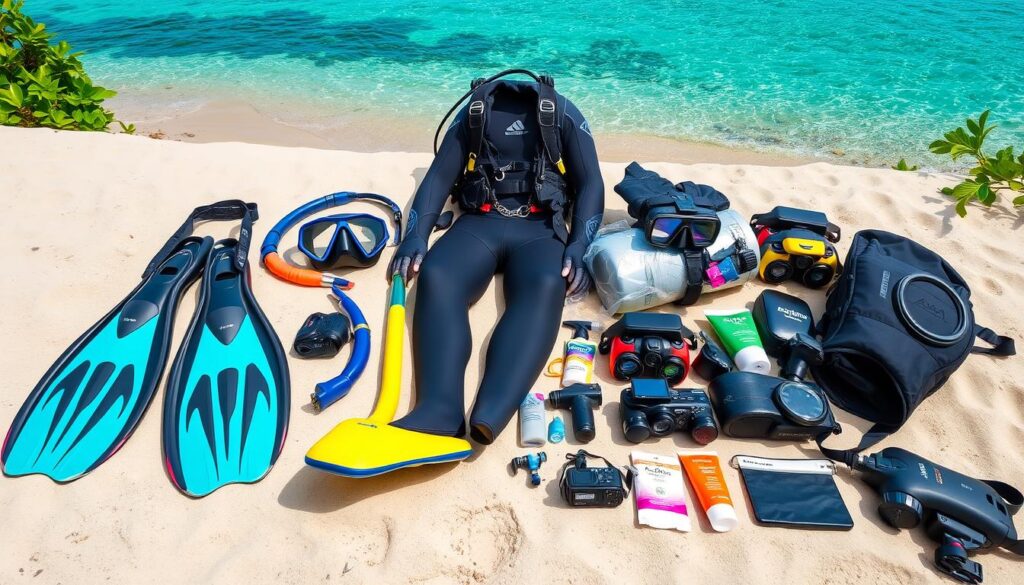
Extra Gear for Comfort and Preparedness
There’s more than just basic gear for a great dive. Consider these extra items for a better experience:
- Waterproof camera and extra SD cards
- Lightweight, quick-dry clothing layers
- Sun protection (minimum SPF 15 sunscreen)
- Insect repellent
- Compact first aid kit
“Preparation is the key to an unforgettable diving adventure in the Solomon Islands.”
Packing smart means thinking about luggage weight and airline rules. Pro tip: Wear bulky items during travel to save space. Remember to pack a copy of your vaccination certificate and a doctor’s letter if you have medical supplies.
| Packing Category | Essential Items |
|---|---|
| Health Supplies | First aid kit, personal medications, hand sanitizer (60% alcohol) |
| Documentation | Passport, insurance cards, dive certifications |
| Protection | Sunscreen, insect repellent, protective clothing |
By preparing your gear well for Scuba Diving in The Solomon Islands, you’re set for an amazing dive. You’ll dive into an incredible underwater world with confidence and excitement.
Solomon Islands Recommended Scuba Diving Itinerary
When planning your scuba diving adventure in the Solomon Islands, it’s helpful to have a recommended itinerary to make the most of your time and experience the diverse range of dive sites available. Here, we present a sample itinerary that showcases some of the best scuba diving locations in the Solomon Islands.
Day 1: Arrival in Honiara
After arriving at Honiara International Airport, transfer to your accommodation and settle in. Take the opportunity to explore the capital city, visit local markets, and immerse yourself in the vibrant culture of the Solomon Islands.
Day 2-4: Tulagi Diving
Depart from Honiara and head to Tulagi, a historical diving destination. Spend the next few days exploring World War II wrecks, including the USS Aaron Ward and the Tokyo Maru, which have now transformed into thriving artificial reefs. Encounter an array of marine life while exploring the fascinating history beneath the waves.
Day 5-7: Marovo Lagoon
Fly or take a boat to the Western Province and embark on an unforgettable diving experience in Marovo Lagoon. Spend the next few days diving in this vast saltwater lagoon, known for its stunning coral gardens and diverse marine life. Dive sites such as Leru Cut and Mary Island offer thrilling encounters with pelagic species, colorful coral formations, and intriguing underwater landscapes.
Day 8-10: Munda and Gizo
Travel to Munda, located on the island of New Georgia, and explore the vibrant dive sites in the area. Dive the famous Shark Point and Mushroom Island, encountering reef sharks, rays, and a kaleidoscope of tropical fish. Continue the journey to Gizo, where you can explore the renowned Grand Central Station and White Nipper dive sites, renowned for their impressive coral bommies and schools of fish.
Day 11-12: Russell Islands
Head to the Russell Islands, which offer a variety of dive sites suitable for all levels. Dive the mesmerizing Twin Tunnels, known for its vibrant coral gardens and swim-throughs. Encounter colorful reef fish and be on the lookout for the occasional turtle or eagle ray.
Day 13-14: Honiara Exploration
Return to Honiara and take the opportunity to explore more dive sites in the area. Dive the Florida Islands, which offer a range of underwater landscapes and marine encounters. Dive sites such as Twin Tunnels and Leru Cut provide divers with thrilling experiences and beautiful underwater scenery.
Day 15: Departure
Bid farewell to the Solomon Islands as you depart from Honiara International Airport, taking with you cherished memories of your scuba diving adventure.
It’s important to note that this itinerary is a suggested framework and can be customized based on your preferences, time constraints, and the availability of dive operators. Weather conditions and transportation logistics may also influence the actual sequence and duration of each dive site visit.
When planning your scuba diving itinerary, consider factors such as dive site accessibility, transportation options between locations, and the desired duration of your stay at each dive destination. Consult with local dive operators and experts to ensure that your itinerary aligns with the best diving conditions and allows for a well-rounded exploration of the Solomon Islands’ underwater wonders.
With this recommended itinerary as a guide, you can embark on an incredible scuba diving adventure, immersing yourself in the breathtaking beauty of the Solomon Islands and creating memories that will last a lifetime.
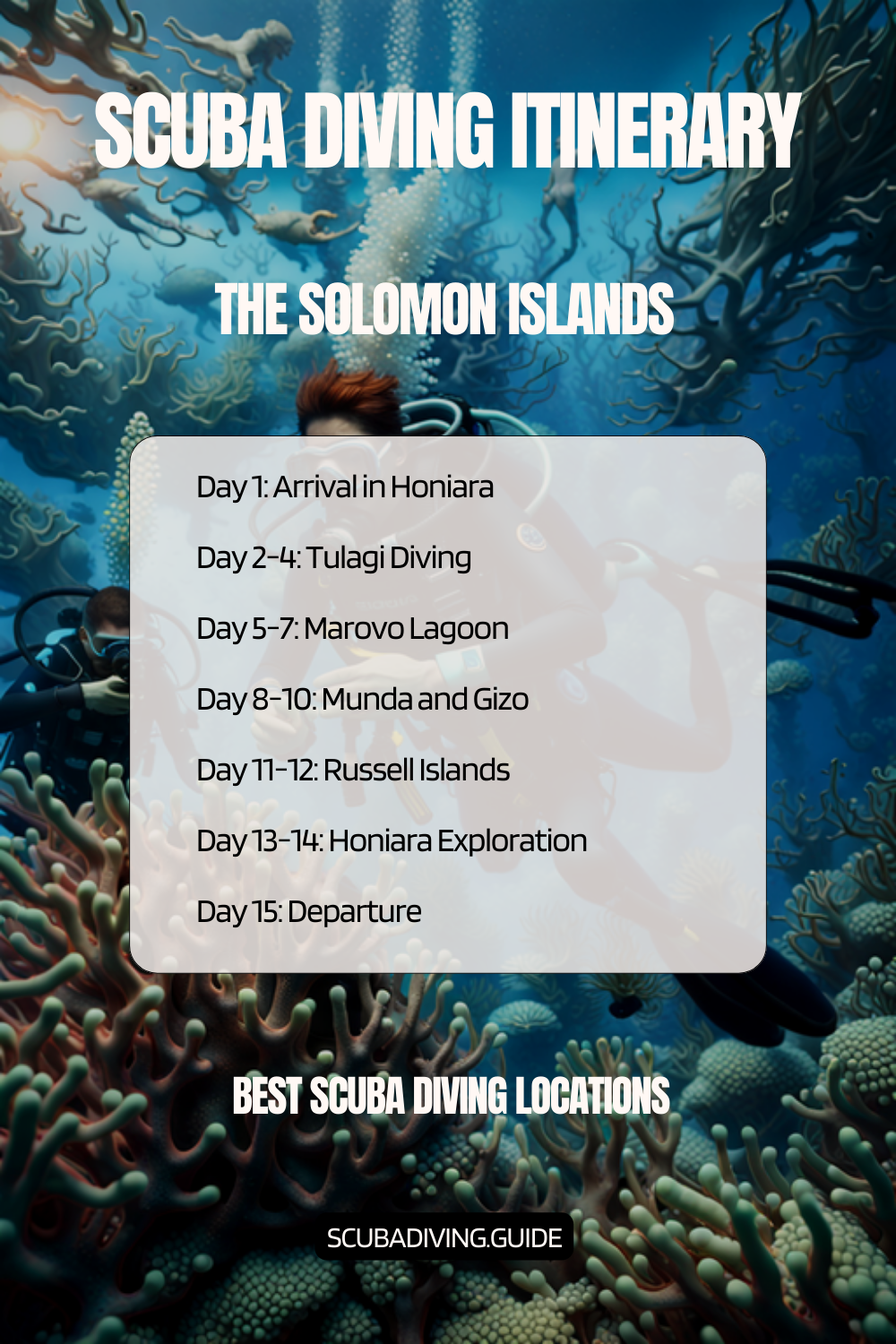
Other Countries to Consider
- Fiji
- Papua New Guinea
- Vanuatu
Conclusion: Dive into Paradise!
Scuba diving in the Solomon Islands is an unmatched underwater adventure. It attracts divers from all over the world. The islands have 992 pristine tropical waters, making it a unique place to dive.
Here, you’ll find historical shipwrecks, colorful coral gardens, and untouched marine ecosystems. These features make it a must-visit for underwater explorers.
Recap of Adventures Awaiting
The Solomon Islands are home to the legendary Iron Bottom Sound and World War II wreck sites like the Kinugawa Maru. These sites offer an immersive experience unlike any other. Professional underwater photographers like Matt Meier have captured the area’s incredible marine life.
They’ve shown off the area’s stunning reefs with massive sea fans and incredible plate corals. Every dive here is a unique adventure.
Encouragement to Book Your Trip
Your ultimate underwater paradise is waiting for you in the Solomon Islands. It offers a unique and intimate scuba diving experience. With minimal dive boat traffic and an abundance of marine life, it’s a special place to explore.
Whether you’re diving historical shipwrecks or swimming through vibrant coral gardens, it’s an adventure that will change your view of underwater exploration. So, pack your gear, get ready for an adventure, and dive into one of the world’s most pristine marine environments.
FAQ – Scuba Diving in The Solomon Islands
What makes the Solomon Islands a unique diving destination?
The Solomon Islands boast pristine coral reefs and incredible marine life. They are part of the Coral Triangle, known for untouched underwater landscapes. Divers can explore world-class sites with minimal human impact, including stunning WWII wrecks and vibrant marine ecosystems.
What marine life can I expect to see while diving in the Solomon Islands?
Divers will see a wide variety of marine life. This includes large pelagic fish, colorful nudibranchs, cuttlefish, reef sharks, sea turtles, and many tropical fish. The healthy coral reefs support an amazing diversity of marine life.
What are the best months for diving in the Solomon Islands?
The best diving season is from April to December. June to September is the peak time. These months have the best water visibility, calm seas, and comfortable temperatures.
Do I need special certifications to dive in the Solomon Islands?
Advanced open water certification is recommended. Dive operators can accommodate different skill levels. For challenging sites, an advanced certification or experience is needed for safety.
Are there any specific safety concerns for diving in the Solomon Islands?
Divers should be ready for strong currents and limited medical facilities. Dive insurance is essential. Dive with experienced local operators who know the dive sites well.
What type of dive packages are available?
Dive packages include resort-based and liveaboard options. They offer accommodation, meals, guided dives, and equipment rental. Packages can be customized based on your preferences.
How can I contribute to marine conservation while diving?
Practice responsible diving, avoid touching marine life, and use reef-safe sunscreen. Participate in local marine conservation programs. Many dive operators offer sustainable experiences.
What equipment should I bring for diving in the Solomon Islands?
Bring a dive computer, underwater camera, reef-safe sunscreen, dive log, and personal gear. A 3mm wetsuit is also necessary. Some operators offer equipment rental.
How do I get to the Solomon Islands?
Most travelers arrive at Honiara International Airport on Guadalcanal Island. Flights come from major Pacific Rim cities like Brisbane, Sydney, and Port Moresby. Solomon Airlines and others offer regional flights.
What cultural experiences can I expect alongside diving?
The Solomon Islands offer rich cultural experiences. You can interact with local communities, visit traditional villages, and explore handicraft markets. Many dive resorts facilitate cultural exchange programs.
